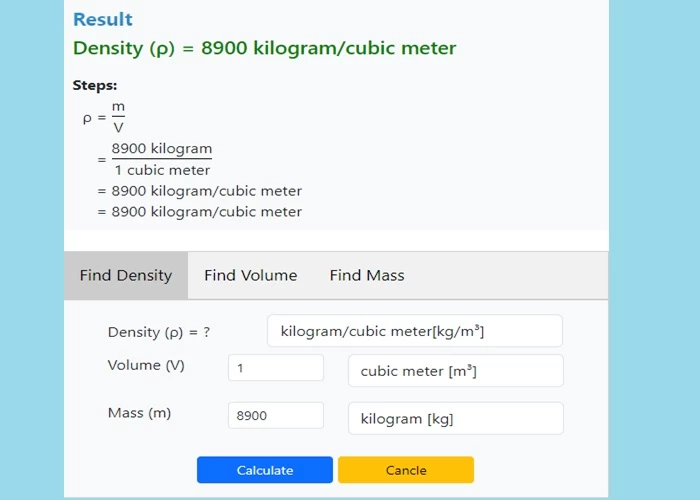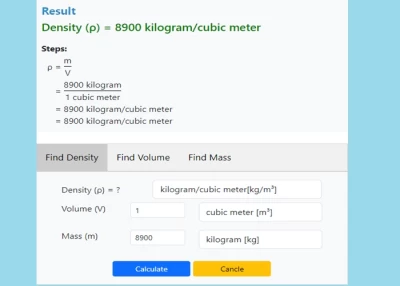Unlocking the Secrets of Density: A Comprehensive Guide and Calculator Overview
Learn why density is a critical parameter, uncover its importance in diverse industries, and empower your scientific endeavors with precise density calculations.

What is density?
Density is a fundamental concept in physics and materials science, representing the mass of an object per unit volume. It is a measure of how much matter is packed into a given space. It is expressed as mass per unit volume (usually in grams per cubic centimeter or kilograms per cubic meter). Understanding density is crucial in various scientific disciplines and industries, providing insights into the composition and properties of materials.
The importance of density lies in its ability to reveal critical characteristics of substances. Whether dealing with solids, liquids, or gases, density can help identify and differentiate materials, assess their purity, and predict their behaviour under different conditions. This makes density a critical parameter in fields such as chemistry, geology, engineering, and environmental science.
Density Calculators
Density calculators are invaluable tools designed to simplify the process of determining density. These calculators streamline the often complex and manual calculations involved, making it easier for researchers, students, and professionals to obtain accurate density values. By utilizing the principles of mass and volume, density calculators offer a quick and efficient means of obtaining this essential physical property.

- Ease of Use: These calculators are designed to be simple. You can quickly put in the information, like the mass and volume, without any trouble.
- Accuracy: They give you results that are really close to the actual density. This means you can trust the numbers you get from the calculator.
- Versatility: Density calculators can be used for many different things. Whether it's liquids, solids, or gases, these calculators can handle various types of materials.
- Additional Features: Some calculators go the extra mile. They help you convert between different units, like switching from grams to kilograms. Also, they have a feature that keeps a record of your calculations, which can be helpful in keeping track of your work over time.
Applications of density calculator:
- Cooking: When you follow a recipe, you need to know how much sugar or flour fits in a cup. The density helps you measure it right.
- Shipping and Packaging: Companies need to know how much space a product takes up in a box. Density helps them pack things efficiently and save space.
- Construction: Engineers use density to choose the suitable materials for building. It helps them make structures solid and safe.
- Health: In medicine, density is used in various ways. For example, doctors use it in imaging, like CT scans, to understand the density of tissues inside the body.
- Oil and Gas Industry: Density is crucial in extracting and processing oil and gas. It helps engineers understand the properties of fluids underground.
- Agriculture: Farmers might use density to figure out how much fertilizer they need for a particular area of land. It helps them grow crops more efficiently.
- Environmental Science: Density is used to study air and water pollution. It helps scientists understand how substances are distributed in the environment.

What is density?
Density is a fundamental concept in physics and materials science, representing the mass of an object per unit volume. It is a measure of how much matter is packed into a given space. It is expressed as mass per unit volume (usually in grams per cubic centimeter or kilograms per cubic meter). Understanding density is crucial in various scientific disciplines and industries, providing insights into the composition and properties of materials.
The importance of density lies in its ability to reveal critical characteristics of substances. Whether dealing with solids, liquids, or gases, density can help identify and differentiate materials, assess their purity, and predict their behaviour under different conditions. This makes density a critical parameter in fields such as chemistry, geology, engineering, and environmental science.
Density Calculators
Density calculators are invaluable tools designed to simplify the process of determining density. These calculators streamline the often complex and manual calculations involved, making it easier for researchers, students, and professionals to obtain accurate density values. By utilizing the principles of mass and volume, density calculators offer a quick and efficient means of obtaining this essential physical property.

- Ease of Use: These calculators are designed to be simple. You can quickly put in the information, like the mass and volume, without any trouble.
- Accuracy: They give you results that are really close to the actual density. This means you can trust the numbers you get from the calculator.
- Versatility: Density calculators can be used for many different things. Whether it's liquids, solids, or gases, these calculators can handle various types of materials.
- Additional Features: Some calculators go the extra mile. They help you convert between different units, like switching from grams to kilograms. Also, they have a feature that keeps a record of your calculations, which can be helpful in keeping track of your work over time.
Applications of density calculator:
- Cooking: When you follow a recipe, you need to know how much sugar or flour fits in a cup. The density helps you measure it right.
- Shipping and Packaging: Companies need to know how much space a product takes up in a box. Density helps them pack things efficiently and save space.
- Construction: Engineers use density to choose the suitable materials for building. It helps them make structures solid and safe.
- Health: In medicine, density is used in various ways. For example, doctors use it in imaging, like CT scans, to understand the density of tissues inside the body.
- Oil and Gas Industry: Density is crucial in extracting and processing oil and gas. It helps engineers understand the properties of fluids underground.
- Agriculture: Farmers might use density to figure out how much fertilizer they need for a particular area of land. It helps them grow crops more efficiently.
- Environmental Science: Density is used to study air and water pollution. It helps scientists understand how substances are distributed in the environment.
Conversation
Latest Blogs
© Blog CoolCalculator, Explore CoolCalculator, your destination for the latest insights, tips, and updates on the world of online calculators. Stay informed and make your calculations smarter with our blog. ,
Designed
by Saad Media Team , Team Lead M.Rizwan Akhtar












